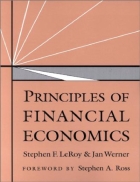




Mã tài liệu: 201657
Số trang: 290
Định dạng: pdf
Dung lượng file:
Chuyên mục: Kinh tế chính trị
Những tài liệu gần giống với tài liệu bạn đang xem
📎 Số trang: 90
👁 Lượt xem: 562
⬇ Lượt tải: 16
📎 Số trang: 694
👁 Lượt xem: 953
⬇ Lượt tải: 23
📎 Số trang: 337
👁 Lượt xem: 451
⬇ Lượt tải: 16
Những tài liệu bạn đã xem
📎 Số trang: 65
👁 Lượt xem: 2047
⬇ Lượt tải: 16
📎 Số trang: 72
👁 Lượt xem: 247
⬇ Lượt tải: 8
📎 Số trang: 65
👁 Lượt xem: 514
⬇ Lượt tải: 17
📎 Số trang: 0
👁 Lượt xem: 350
⬇ Lượt tải: 21
 Principles of Financial Economics 2000
Financial economics plays a far more prominent role in the training of economists than it did even a few years ago. This change is generally attributed to the parallel transformation in capital markets that has occurred in recent years. It is true
pdf Đăng bởi
nguyenlekha
Principles of Financial Economics 2000
Financial economics plays a far more prominent role in the training of economists than it did even a few years ago. This change is generally attributed to the parallel transformation in capital markets that has occurred in recent years. It is true
pdf Đăng bởi
nguyenlekha